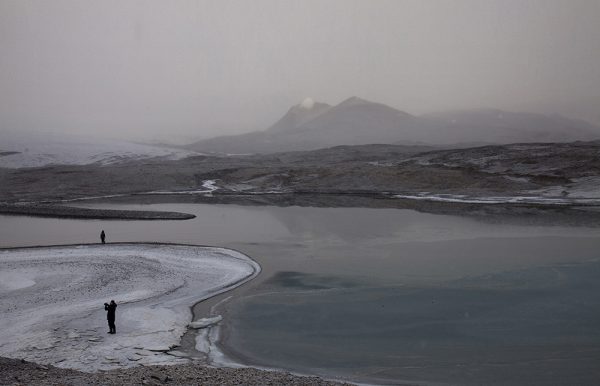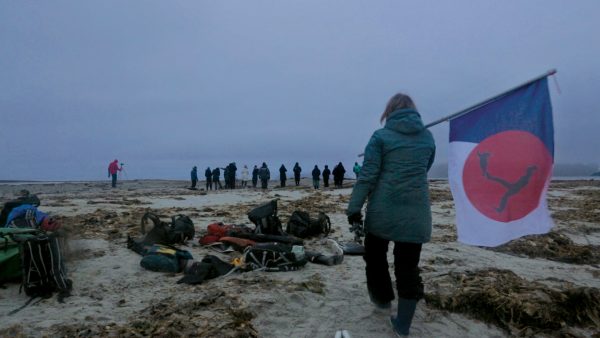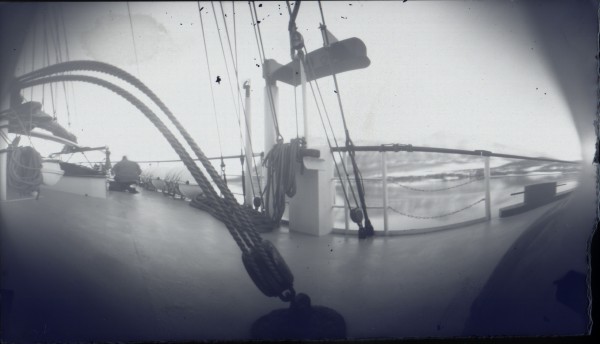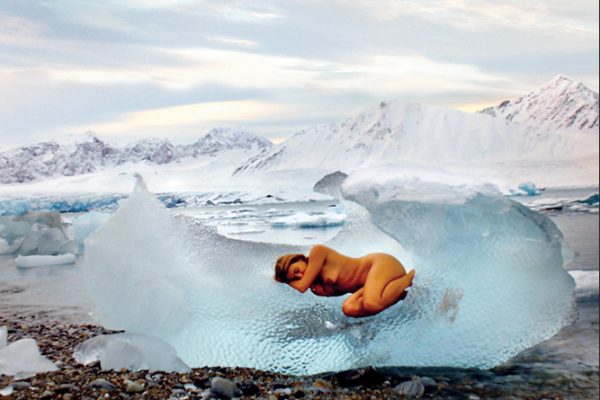DATE: Developed at The Arctic Circle Residency in 2015.
MEDIUM: Performance Art, Activist Intervention, Video, Photography, Immersive Installation
EXHIBITED:
Fondazione Pino Pascali – 2020
SpartiAcque – NUCRÉ 2024
Name Of Show – 00/ Month/ 0000 – Location
OCCUPY NORTH uses the laws governing the sea—both from a naturalistic and political perspective—as a narrative mechanism to highlight its current state of crisis.
Developed during The Arctic Circle art residency in October 2015, it is an exhibition journey that, starting from the provocative occupation of the international territories of the North Pole, opens a debate on colonialism, the political management of international waters, and the right to safeguard heritage through a “voyage” made of photography, video installations, kinetic sculptures, and workshops.
Debating the concept of Mare Liberum [1]—the crucial element that creates and preserves life [2], the free zone governed by the laws of international waters, and often the setting for tensions and conflicts—means debating far beyond the boundaries of the North Pole or even Earth itself. This vast territory extends to the magnetosphere, the stars, the moon, and space, which—governed by the same natural and political laws—is also a land belonging to everyone and no one.
The fundamental lesson I have learned from observing nature is that it is a delicate mechanism of causes and effects, actions and consequences. With most of the world’s population concentrated in enormous urban conglomerates, the detachment from natural mechanisms has reached an unprecedented level. This alienation and unawareness only exacerbate an already fragile socio-economic scenario plagued by the ecological and geopolitical consequences of years of environmental neglect.
My artistic research attempts to reduce this detachment, reconcile visitors with their natural surroundings, and illustrate, through visual and immersive storytelling, how the microcosm that surrounds us is connected to the macrocosm that regulates life on our planet. In fact, it is a quest that views the artwork and the museum that houses it as a tool and a space for discussion and provocation—a laboratory of ideas.
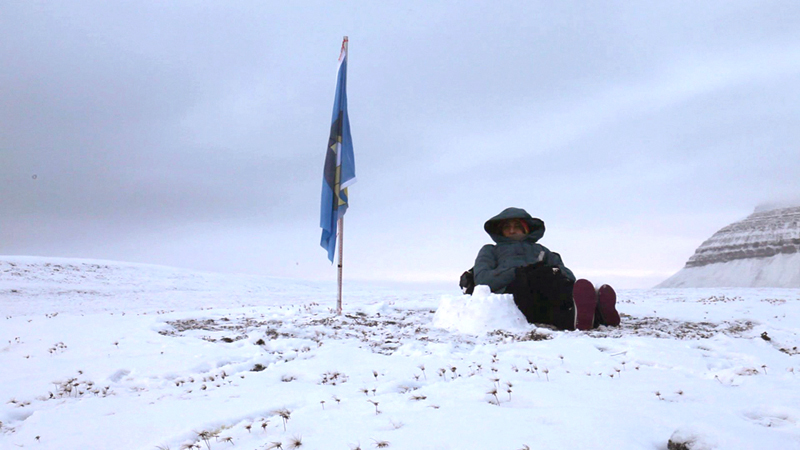
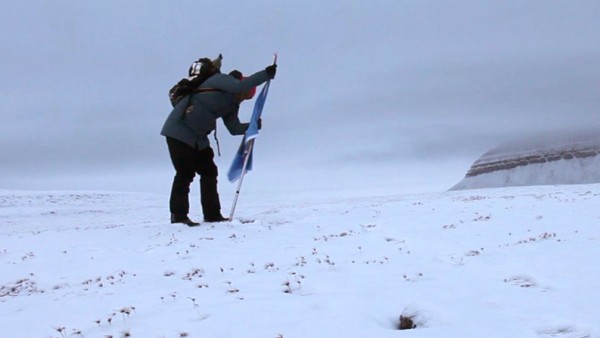
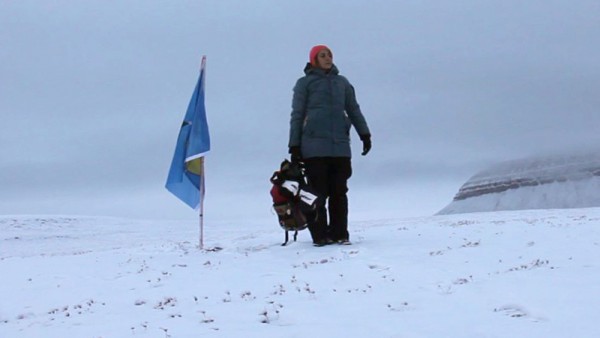
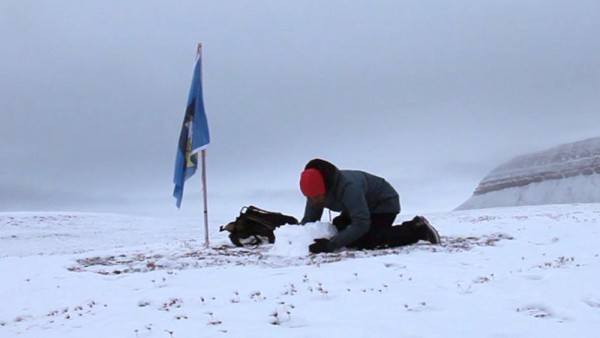
This occupation of the North Pole Territory is a provocative action involving the occupation of four Arctic territories. The project was inspired by the political and economic tensions and controversies surrounding the race to appropriate Arctic territories (safeguarded by the United Nations as part of humanity’s heritage) by neighboring nations. As the title suggests, the project carried out a legal occupation both physically—with group members present on-site—and legislatively, through legal disputes and procedures based on the laws of international law waters.
The Svalbard archipelago is one of the territories governed by these international water laws [3]. At the same time, it is a Norwegian protectorate and is subject to speculation by nations that are part of the Svalbard Treaty [4] , including Italy. Theoretically, the treaty’s signatory nations—and consequently, the private entities within them—have a privileged pathway to occupy the territory and exploit its natural resources.
The melting of polar ice caps due to global warming has inevitably intensified the economic interests of the countries involved in the area. These nations, particularly those directly bordering the Arctic, have sought to extend their sovereignty over the region through a complex dance of continuous disputes with competing states and the United Nations. This political battle has been fought through legal, physical, and diplomatic actions, creating an endless trail of treaties, revisions, and diplomatic declarations over the years.
This tug-of-war has been ironically dubbed “the flag war [5]”, referring to the practice of planting flags in Arctic territories (and on their seabeds [6]) by the interested nations.
Mimicking this “flag war,” I decided to join the race for the North Pole using the same legal, diplomatic, and institutional tools employed in the dispute between the UN and the countries bordering the Arctic Circle. By using my land-art piece as a tool for occupation, I claimed the territory as the setting for a commercial operation. As a commercially quantifiable artistic creation, the work itself—both in its physical form and in the reproduction of its image—undeniably exploits the natural resources of the area, namely the majestic Arctic landscape.
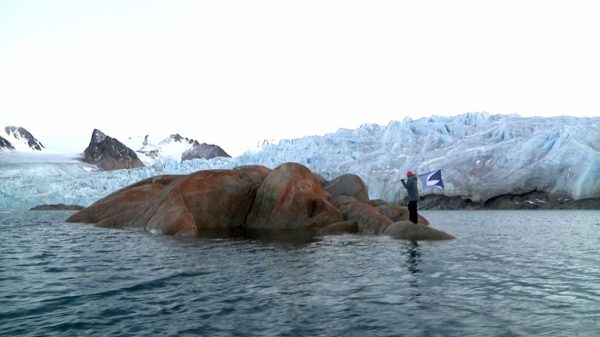

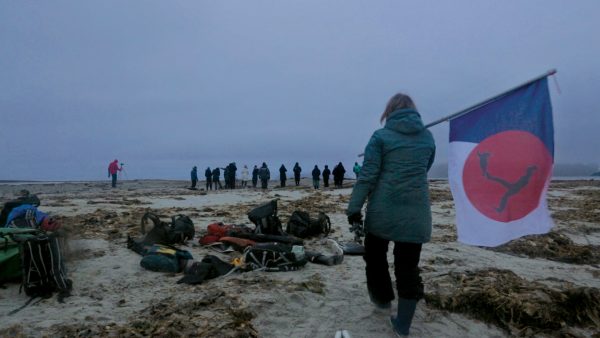

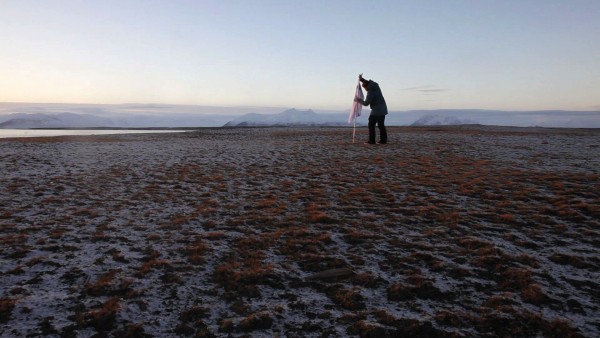
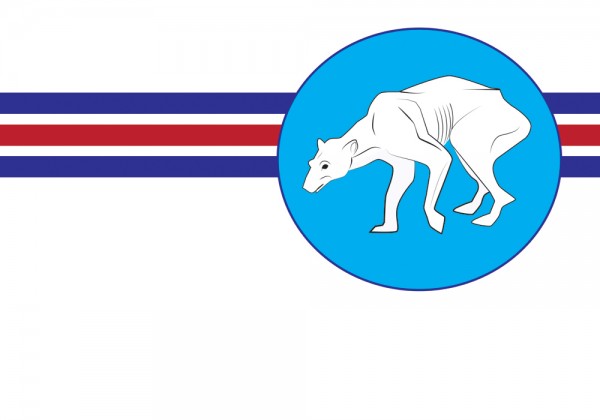
The work consists of four videos documenting the four territorial occupations carried out at the North Pole. Each video is accompanied by corresponding flags installed on poles in a celebratory spirit, representing the specific occupation.
The project culminates with the fourth and final video, in which two individuals armed with flags attempt to occupy the same territory. This leads to an inevitable conflict over control of territorial resources, which inevitably escalates into an offensive, symbolically represented by a “snowball fight.”
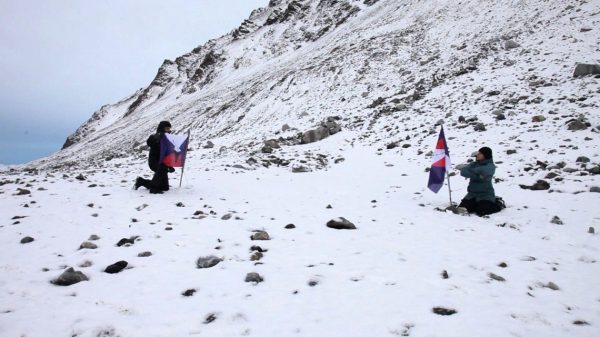
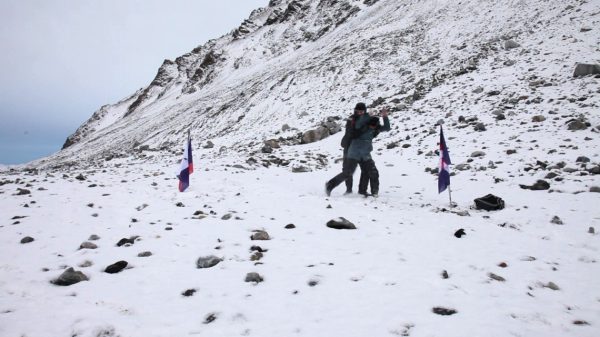
As a provocation, “Occupy North” aims to challenge our legal and social conventions [7]. In the Western world, these conventions are rooted in Roman law, serving a culture that has made colonization its political strength and economic success. Over time, through a tradition of military conquest and exploitation, these conventions have taken hold in the rest of the world [8].
On the brink of a new space exploration race, the question worth asking today is: are we prepared to carry these conventions to the moon, the asteroids, and Mars?
“Meditation Series” is in direct contrast to my territorial occupation yet also a reaction to my pointless and violent territorial attacks.
Because site-specific work results from experiencing the space, it must mutate with the experience. This series marks the beginning of a pivot in perspective that led to a new set of Arctic-inspired works.
Sailing the Arctic was a life-changing experience.
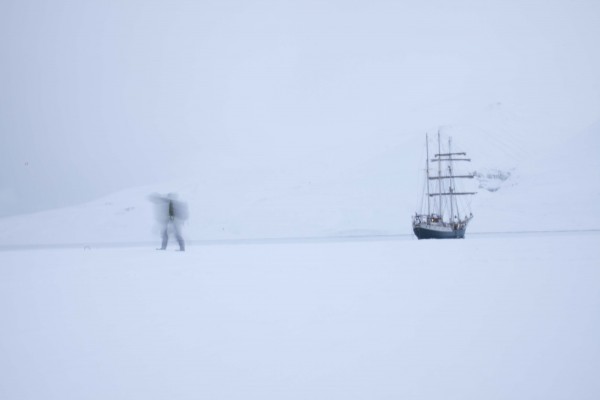

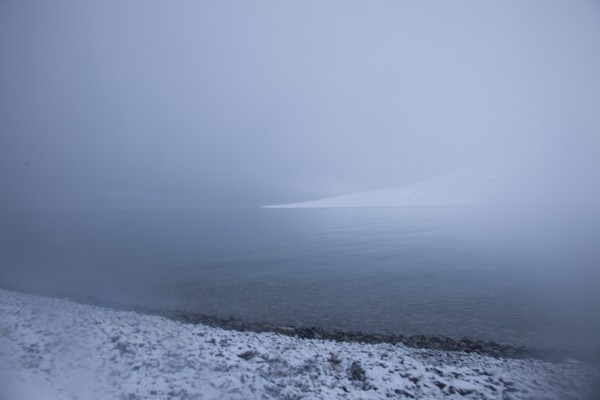
I was instantly captivated by the Arctic landscape: honest, violent, beyond human internationalization, unquestionably alive, yet so vulnerable.
This balance between power and vulnerability makes it incredibly powerful.
A beauty and strength that simply exists.
A beauty and strength that doesn’t need to show off. Tundra lichen freezes over, surviving the winter, yet a footprint can damage it for years.
Snow deer eat grass all summer to endure winter, yet in the spring, when life thrives, they are most vulnerable and can die of a heart attack if frightened by a tourist taking a photograph.
Birds eat fish and baby seals. Seals need thick snow to build a shelter. If the snow is too thin, birds break through with their beaks and kill the cubs.
Polar bears are deadly hunters yet drown due to a lack of ice to hunt on.
As I exposed myself and my work to the Arctic landscape (recording sounds, taking pictures and videos, and occupying arctic land), I lost the need and desire to use the word “I,” and even more so, I was repelled by the idea of sticking flags in such a landscape.
“I,” such a cry for attention,” I thought.
”I,” echoes with that vulgar and deadly pile of plastic.
”I” am an artist!?
”I” am here in the Arctic, making art.
”I” am Italian. Am ”I”?
”I” realize how hard it is to avoid the word ”I” in the English language. Or am ”I” a bad writer?
”I want to be like the Arctic.
”I want my work to be like the Arctic
of an honesty, a power, and a beauty that just is, without the “I.”
”I” felt pointless. That is when the Arctic broke me, stripping me of the certainties “I” relied on, shipwrecking me on the shore.
What came to my rescue was a piece of ice. Peaceful and beautiful. Temporarily run ashore by the currents and shaped like a womb, it invited me to climb in and rest. Meditating with it, I abandon all the intellectual acrobatics I have been so well trained in, toss the toolbox and feel. Exploring the space through the body, lungs, and skin, where I found a new center.
So, after many years, I returned to bare skin and, with it, to performance art. Back to where I started as an artist.
Naked, I lay on the ice, letting myself go, concentrating, breathing, navigating the texture of the ice with my finger, drifting with the sound of the melting ice beneath me, surrounded by the reverberating sound of ice touching, floating, dancing, like tiny bells all around me and by the occasional thundering of the glacier calving in the distance, I was all and nothing at all.
Finally, I understood, I was there, here in the Arctic, vulnerable, honest, unshielded.
As I melted as one with the ice I was free.
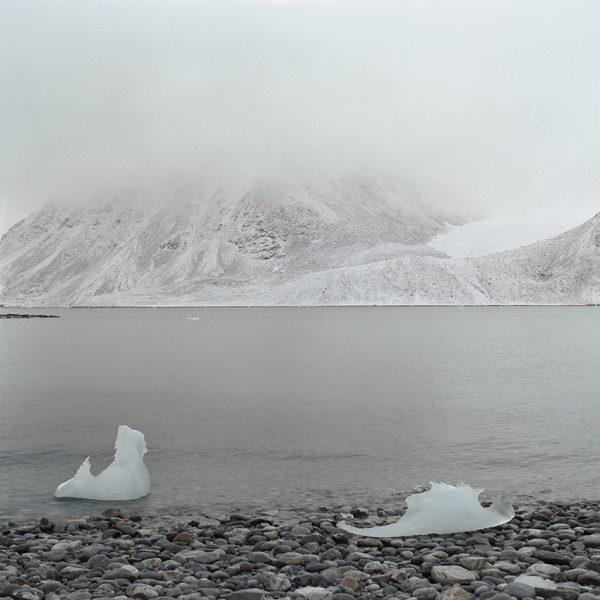
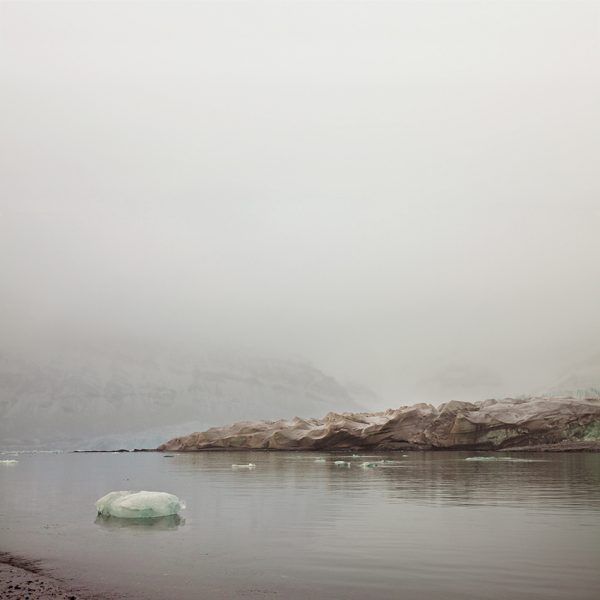
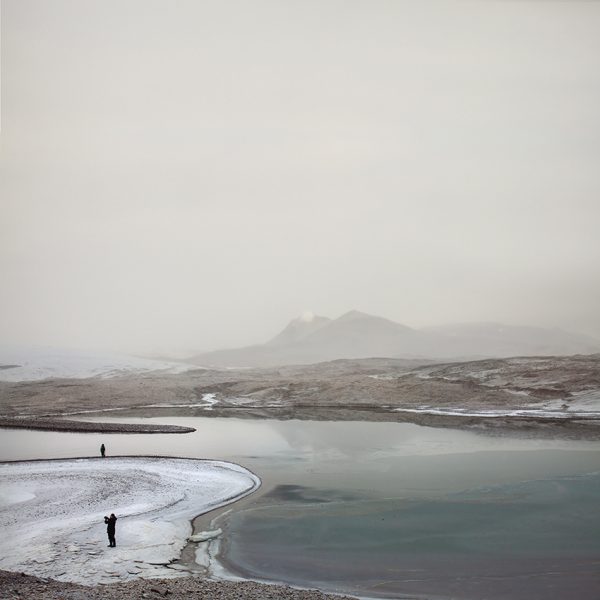
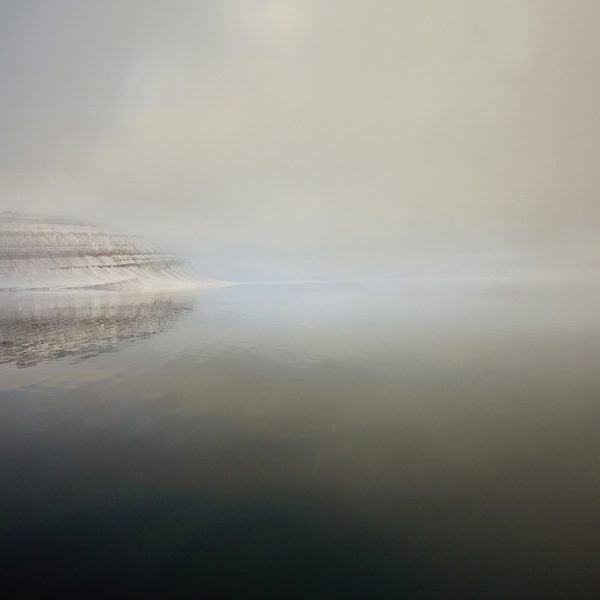
Disrupting the Arctic’s delicate balance of life and death is catastrophic for ecosystems, so imagine my rage when I saw pristine Arctic shores covered in trash from all over the world.
Plastic on top of plastic carried by the ocean currents: shampoo bottles, ropes, tons of broken fishing nets, fishing lines, and plastic bags entangled around every living form it finds in its path.
Our captain spotted a seal gasping in pain, choking, and trapped in a plastic rope, with its skin cut to the flesh.
This seal survived the winter, birds, hunters, and polar bears; today, it will die from this vulgar piece of plastic.
Here is a video of the plastic we collected during a one-hour beach cleanup. This is a 1.5-cubic-yard bulk bag.
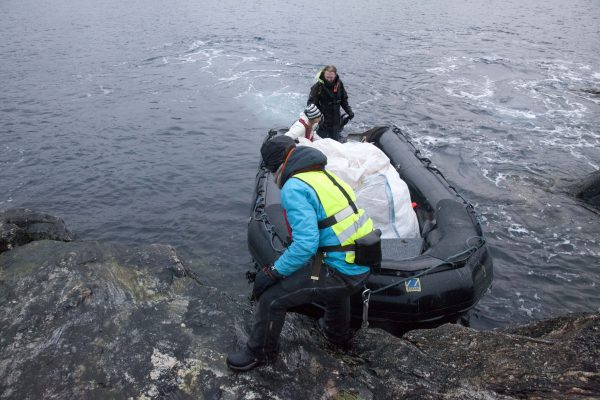
Arctic territories are not only contested territories but also the scene of a pressing environmental crisis caused by pollution and atmospheric warming.
Each year, ocean currents transport tons of plastic toward the North Pole, destroying the Arctic landscape. Once broken down, plastic and microplastics clog the ocean currents that have carried plankton and oxygen—the nourishment and support of life on our planet—for millions of years.
On Midway Island, a protected area and breeding ground for albatrosses, millions of chicks die each year from ingesting plastic carried into the waters by the currents [19]. Chris Jordan’s film Albatross details this ecological crisis [20].

Due to melting ice in the past decade, the Arctic has unexpectedly become a tourist destination, attracting massive cruise ships that visit the region every summer. Exploiting the vague nature of international maritime laws [21], these ships are permitted to dump waste and garbage into the sea [22] in quantities equivalent to three to four passenger jets per person in terms of carbon dioxide emissions [23] .
In the face of such an alarming situation, it is easy to see the impact the human microcosm inflicts on the planetary macrocosm. This impact parallels what we observe on our own land and coasts. Drawing from this experience—and expanding on concepts explored in projects like Dimensional Homogeneity—with Natural Effect, I aim to examine the architectures governing wind and ocean current flows, making visible the impact of plastic released by humans and transported by these natural forces in the most remote and pristine natural habitats in the world, such as the North Pole to the Pacific.
Natural Effect is a kinetic sculpture that functions as a human-scale wind simulator. The work uses plastic waste to visualize the impact of plastic discarded into our environment. By using the laws of “apparent deflection,” I simulate a miniature garbage vortex with powerful fans that push air up, down, and around the room. The visitor walks into a controlled environment where wind currents sculpt the surrounding space with dunes and patterns of plastic particles. Here, the visitor’s position is reverted from “the polluter” to “the one polluted upon.”

This work aims to unveil a new landscape in which the poetry of the Universe’s dynamics emerges from invisibility, becoming an aesthetic experience. It also seeks to address the ecological emergency by re-establishing a connection between our actions and their consequences.
Natural Effect Installation Options:
- As a standalone element in the center of a space.
- Within a sealed room that transforms into a wind simulator, visitors can enter at their own risk.
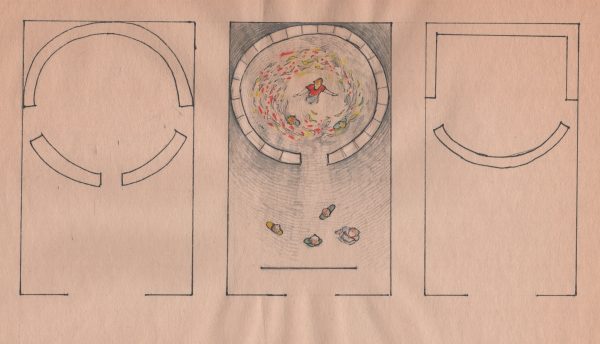
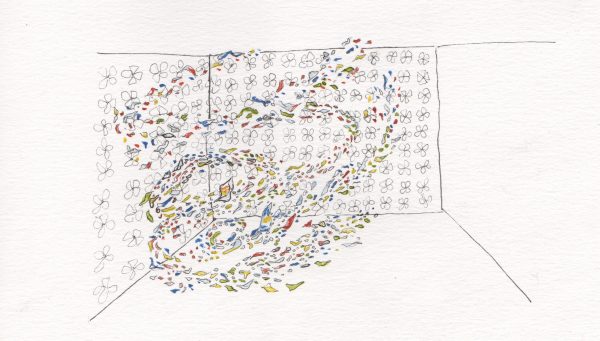

Occupy North is a window into the history of human civilization. The project offers a reflection on the past and proposes a new sensibility that could serve as the ethical, social, and legal foundation for the world to come. These are the pillars on which to build the future of international legislation, exploration, and space colonization.
The Moon serves as an example [9]. Although it is still unclaimed territory, it is legally defined as the heritage of all, to be used in common, like international waters.
In December 2020, China landed on the Moon [10], marking the first lunar landing since Apollo 17—the last U.S. mission—nearly 50 years ago. Legally and culturally, this space achievement by China was perceived by the United States as a challenge to its perceived sovereignty over the Moon [11], especially in light of public statements made years earlier about establishing a U.S. lunar base in the not-so-distant future.
Today, both nations claim to “utilize” the Moon in the name of exploration and scientific research as an “obvious benefit to humanity.”
However, justifying occupation in the name of scientific exploration is one of the most frequently used strategies in colonialism’s history. One of its most direct consequences is the Europeanization of scientific and astronomical language [12].
In this way, we continue to silently apply colonialist and exploitative principles and attitudes today with the same short-sightedness and arrogance of past millennia [13]. These biased concepts—or rather, privileges—are so ingrained and familiar in our culture that they seem invisible and impossible to dismantle. They are harmful habits [14] hidden in the words, punctuation, and clauses that legally define what is permissible, lawful, or even normative.
The history of humanity, however, is marked by its evolutionary leaps, not by its most regressive traditions. It is the evolutions that challenge daily life, normality, and the legality of our social habits that have brought us democracy, gender equality, and the abolition of racial laws. These are actions that have rewritten substantial legal definitions to adapt to a new society, a new legality, and a new normal. These are infrastructural changes that redefine the world and the common good, developing new economic, technological, and social legal dynamics [15].
This is the line followed by the legal actions of young people in Florida, who forced the government to legislate in favor of protecting natural heritage on the basis of the right to life. Similar are the legal actions taken by children against governments worldwide [16], and the legal battles to grant water the same rights as a human being [17]. In New Zealand, new legal resolutions granted the Whanganui River [18] the same rights as a human.
These are the themes that will be discussed in an interdisciplinary working group led by international professionals and, subsequently, in a public workshop open to students, artists, and activists.
[1] Mare Liberum – Hugo Grotius – 1609: “Mare Liberum,” as defined in Hugo Grotius’s dissertation on the freedom of the seas in the context of the right to trade, is a treatise that forms the basis of the jurisprudence of the Law of International Waters. This law was created to regulate the “use of the sea” and its juridical identity within the context of commerce, specifically colonial expansion that took place by sea.
[2] “50 to 80% of oxygen is produced by our oceans.” How much oxygen comes from the ocean? – National Ocean Service: https://oceanservice.noaa.gov/facts/ocean-oxygen.html
[3] Mare Liberum – Ugo Grozio – 1609: The legislative principles underlying navigation laws and international waters laws are often traced back to Hugo Grotius’ dissertation, Mare Liberum. Here, the sea or ocean is described as “immense, infinite, part of all things, joined to the sky.” Its nature precludes ownership because the sea “cannot be contained or enclosed, and rather possesses than allows itself to be possessed.” This inherently makes the sea a common heritage for all, to be used by all for commercial purposes (navigation, fishing, etc.). It is a so-called “primary” right, whereby “it is permitted for every people to travel to any other and trade with them.” A right that, if denied, would result in the improper appropriation of the right to use a common good and thus constitute grounds for a “just war.” On these philosophical foundations, colonial expansion was justified, defining the right to use and free trade as the right of “every Christian,” because “God speaks through nature,” not wishing that “every place should produce all that is necessary for life” but rather “to promote friendship among men through mutual scarcity and abundance, fearing that someone, believing themselves self-sufficient, might become unsociable as a result.”
[4] Svalbard Treaty: https://en.wikipedia.org/wiki/Svalbard_Treaty
[5] Territorial claims in the Arctic: https://en.wikipedia.org/wiki/Territorial_claims_in_the_Arctic
Countries in tug-of-war over Arctic resources: http://www.cnn.com/2009/TECH/science/01/02/arctic.rights.dispute/index.html
Frozen conflict: https://www.economist.com/international/2014/12/17/frozen-conflict
How Russia is fortifying the Arctic: http://theweek.com/articles/614075/how-russia-fortifying-arctic
Hans Island: https://en.wikipedia.org/wiki/Hans_Island
[6] The International Law of the Sea – Donald R. Rothwell and Tim Stephens – 2016: If a nation manages, through engineering and technology, to expand into and occupy an international territory, that territory could potentially become its “property.” The rapid progress in the occupation and use of international territories has led to the swift and aggressive development of jurisprudence and research around international laws. This development will shape not only the future of freedom, exploration, use, and commerce at sea but also in space.
[7] Examples of practices at the intersection of art, activism and pollical theory
The NSK state: https://passport.nsk.si/en/about_us
Pirate radio in the United Kingdom: https://en.wikipedia.org/wiki/Pirate_radio_in_the_United_Kingdom
Principality of Sealand: https://en.wikipedia.org/wiki/Principality_of_Sealand
Repubblica Esperantista dell’Isoladelle Rose: https://en.wikipedia.org/wiki/Republic_of_Rose_Island
[8] Jeremiah Heaton self-proclaimed himself as king South Sudan to make his daughter a princess: https://www.telegraph.co.uk/travel/news/Man-founds-a-country-so-he-can-make-his-daughter-a-princess
[9] Moon Treaty: https://en.wikipedia.org/wiki/Moon_Treaty
[10] Bringing Space Law Into the 21st Century – Donald R. Rothwell – 2021: https://www.realcleardefense.com/articles/2020/12/15/bringing_space_law_into_the_21st_century_653203.html
[11] Does a U.S. Flag on the Moon Amount to a Claim of Sovereignty Under Law? -Donald R. Rothwell & Imogen Saunders – 2019: https://www.realcleardefense.com/articles/2019/07/26/does_a_us_flag_on_the_moon_amount_to_a_claim_of_sovereignty_under_law_114611.html
[12] Indigenous astronomies and “astro-colonialism” – Zoe Tennant – CBC Radio Canada 2021: https://www.cbc.ca/radio/unreserved/we-come-from-the-stars-indigenous-astronomy-astronauts-and-star-stories-1.5861762/indigenous-astronomies-and-astro-colonialism-1.5865387?__vfz=medium%3Dsharebar
[13] Example in neo colonialism: Jeremiah Heaton self-proclaimed himself as king South Sudan to make his daughter a princess: https://www.telegraph.co.uk/travel/news/Man-founds-a-country-so-he-can-make-his-daughter-a-princess
[14] Mare Liberum – Ugo Grozio – 1609: ‘The last defense of an injustice is usually the appeal to statute limitations or tradition.”
[15] Our Relationship with Water- Ted Radio Hour : This hour, TED speakers explore ideas around restoring our relationship with water. Guests on the show include legal scholar Kelsey Leonard, artist LaToya Ruby Frazier, and community organizer Colette Pichon Battle. https://www.npr.org/2021/01/28/961674860/listen-again-our-relationship-with-water
[16] Kids suing governments about climate is a growing trend – National Geographic – 2020: https://www.nationalgeographic.com/environment/2019/06/kids-suing-governments-about-climate-growing-trend
[17] Why lakes and rivers should have the same rights as humans – Kelsey Leonard – TED 2020: https://www.youtube.com/watch?v=opdCfb8cCFw
[18] How a River Was Granted Personhood – David Freid -The Atlantic :https://www.theatlantic.com/video/index/587689/river-me/
New Zealand river granted same legal rights as human being – Eleanor Ainge Roy – The Guardian 2017:https://www.theguardian.com/world/2017/mar/16/new-zealand-river-granted-same-legal-rights-as-human-being
[19] Saving the albatross: ‘The war is against plastic and they are casualties on the frontline’ – Anna Turns – The Gurdian – 2018: https://www.theguardian.com/environment/2018/mar/12/albatross-film-dead-chicks-plastic-saving-birds
[20] Albartoss – Film Documentary by Chris Jordan: https://www.albatrossthefilm.com
[21] The Real Cost of Cruises – Partiot Act – Hassan Minhaj – Netflix – 2020: The episode explores how, under the guise of offering an affordable and enjoyable vacation, cruise ship companies exploit the vague nature of international maritime laws at the expense of passenger safety, committing violations of labor rights and environmental protection. https://www.netflix.com/watch/80991187?trackId=13752289&tctx=0%2C0%2Ca7952bd5c9cbf009b62ae45186ee4e00acc0061c%3Af886063a8f97e740ced66b5a575ed6bd7c343854%2Ca7952bd5c9cbf009b62ae45186ee4e00acc0061c%3Af886063a8f97e740ced66b5a575ed6bd7c343854%2Cunknown%2C
[22] Carnival Cruises to Pay $20 Million in Pollution and Cover-Up Case – Sarah Mervosh – New York Times – 2019:https://www.nytimes.com/2019/06/04/business/carnival-cruise-pollution.html
[23] If Seeing the World Helps Ruin It, Should We Stay Home? – Andy Newman – New York Times – 2019: “The International Council on Clean Transportation, a nonprofit research group, stated that even the most efficient cruise ships emit 3 to 4 times more carbon dioxide per passenger than a passenger on a commercial jet.” “The emissions from a one-way flight from New York to Los Angeles reduce Arctic ice cover by 3 square meters or 32 square feet.”https://www.nytimes.com/2019/06/03/travel/traveling-climate-change.html .
[24] In 2019, the European organization Transport & Environment (T&E) demonstrated that, in Europe alone, Carnival Corporation emitted 10 times more sulfur oxide (SOX) air pollution than all 260 million cars on the continent in 2017.
Transport & Environment (T&E) is a nonprofit, politically independent organization that focuses on developing a clean and sustainable transport industry through a scientific approach. https://www.transportenvironment.org
Carnival cruise ships produce more sulfur oxide than all Europe’s cars, analysis claims – Emma Beswick, Euro News, 2019:
“Cruise ships operated by Carnival Corporation emitted nearly 10 times more sulfur oxide (SOX) air pollution around European coasts than all 260 million cars on the continent in 2017, according to a new analysis. Spain, Italy, Greece, France, and Norway were the most exposed to cruise ship air pollution in Europe, the campaign group Transport & Environment stated” https://www.euronews.com/2019/06/10/carnival-cruise-ships-produce-more-sulphur-oxide-than-all-europe-s-cars-analysis-claim

